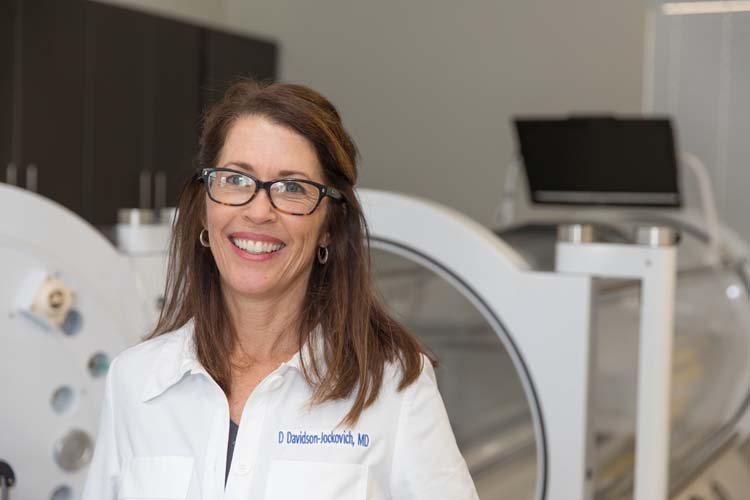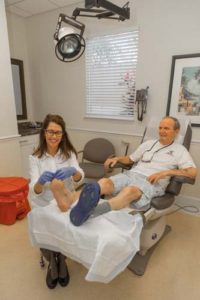
The Center for Wound Care & Hyperbaric Medicine in Sebastian has a new director – but Dr. Dawn Davidson is no rookie at the Sebastian River Medical Center.

Dr Dawn Davidson-Jockovich with patient, George Durr. Staff photos: Denise Ritchie
The youthful-looking Davidson first came to SRMC as an attending physician in the hospital’s emergency department in 1996.
In 2014 she moved across the street to join the wound center’s team and then, this past November, she was named as its new director, replacing the retired and almost universally liked and respected Dr. Tim Adkins.
“Dr. Adkins really made this easy for me,” says Davidson. “He made the transition so easy. I think we’re a pretty tight ship and I’ll just continue his ways and also look for new ways to make things even better.”
In wound care, that will be no easy task and certainly not a small one.
Each year in this country some 6.5 million patients suffering from a wide range of diseases – from diabetes and hypothyroidism to chronic obstructive pulmonary disease, congestive heart failure and chronic venous insufficiency – seek wound treatment in some form.
In fact, caring for wounds that are slow to heal has become a huge multinational business amounting to $25 billion a year, according to Advance Tissue, one of this country’s largest suppliers of wound care products.
And the stakes could hardly be higher for patients seeking this type of care.
“We’ve seen a huge increase in diabetes in our population,” which can lead to “poor circulation and neuropathy and increased inflammation and infection,” Davidson says. “Those three things lead to chronic wounds that are difficult to treat. Diabetic foot wound is a big part of our practice pattern here.”
The normally upbeat Davidson turns somber as she continues: “The problem with chronic wounds is – it’s not just like you are going to walk around with a little wound. The wound progresses. If you’re diabetic and you get an infection in your bone, you’re at great risk to lose your limb.”
“If you are diabetic, your five-year mortality is 50 percent once you have had an amputation.”
Meanwhile, Science Daily points out that “between 19 and 34 percent of patients with diabetes develop chronic foot ulcers, the presence of which significantly increases their risk of death compared with patients without foot ulcers.”
Add to that a rising obesity rate and an aging population and it’s no wonder $25 billion is being spent annually looking for effective treatments.
We’re not just talking Band-Aids and Neosporin here: Treatments range from stem cells to spider webs.
While stem cells seemed promising at first, that promise has so far failed to yield clear clinical successes. But seaweed and spider webs have proven effective.
“We use all kinds of amazing products,” Davidson says. “Honestly. There are some new dressings that have spider webs, the chitin dressings that are super absorbent. We use alginates all day everyday here and that’s derived from seaweed. There are always new things. That’s part of the money part of it. The companies that produce dressings are always looking for something that works better.”
Davidson then turns the conversation to “moisture management.”
“You want a wound moist, but not wet and not dry,” she says.
“Patients have a hard time with that,” she explains, “because when you’re a kid and you get a little cut, you don’t want it goopy. You want it to dry and then the scab falls off and you’re good.”
“But once you’re dealing with a wound that’s not going to heal in three days, you do need to manage the moisture. You want to manage the drainage so that it doesn’t have moisture next to it all the time, but you don’t want it to dry out because that will slow down the healing.”
Moisture management aside, Davidson concludes by saying, “If you ask me what I’m most excited about – what I would want people to know about – it wouldn’t be spider webs or stem cells or chitin. It would be to take good care of your feet and legs and if you have a problem, get help soon.”
Dr. Dawn Davidson is the director of the Center for Wound Care & Hyperbaric Medicine at 13695 U.S. 1 in Sebastian. The phone number is 772-581-2070.




Comments